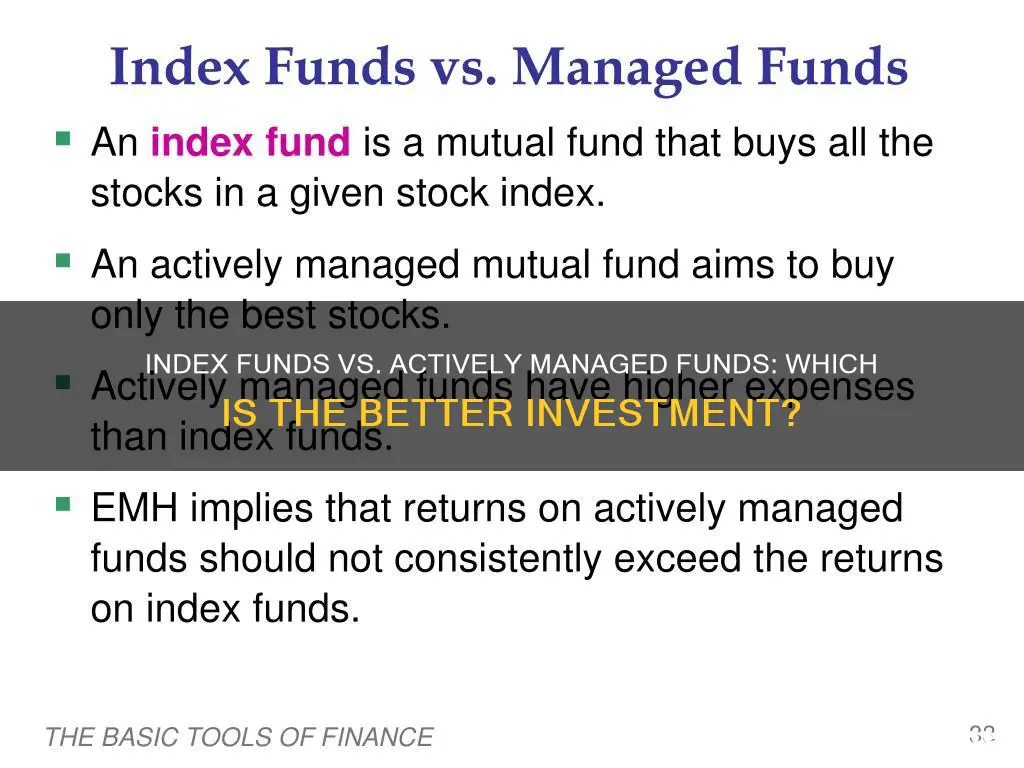
Index funds and actively managed funds are two popular investment options that differ in their management style, investment objective, and cost. Index funds are passively managed, aiming to mirror the performance of a specific market index, while actively managed funds involve a fund manager who actively selects securities to try and outperform the market. The choice between the two depends on an investor's risk appetite, investment goals, time horizon, and risk tolerance.
| Characteristics | Values |
|---|---|
| Management Style | Index funds are passively managed, whereas actively managed funds are actively managed. |
| Investment Objective | Index funds aim to mirror the performance of a specific market index, whereas actively managed funds aim to beat the market. |
| Cost | Index funds have lower fees and expense ratios compared to actively managed funds. |
| Turnover | Actively managed funds have higher turnover, leading to potential tax implications. |
| Performance | Actively managed funds may offer higher returns but are less predictable and more volatile. |
| Risk | Actively managed funds are riskier due to their active trading nature and reliance on fund manager performance. |
| Flexibility | Actively managed funds offer more flexibility as they can adjust holdings based on market conditions. |
| Suitability | Index funds are suitable for long-term, buy-and-hold investors seeking broad market exposure and consistent returns. Actively managed funds are suitable for investors seeking to beat the market and willing to accept higher costs and risks. |
What You'll Learn
- Index funds are passive investments, whereas actively managed funds are actively traded
- Index funds are designed to mirror market performance, whereas actively managed funds aim to beat it
- Index funds are less expensive, with lower fees and expense ratios
- Index funds are more tax-efficient due to lower turnover
- Actively managed funds offer more flexibility and the potential for higher returns

Index funds are passive investments, whereas actively managed funds are actively traded
Index funds and actively managed funds are both investment options that allow investors to acquire an ownership interest in a large and typically well-diversified basket of securities. However, they differ in their management style, investment objectives, and costs.
Index funds are passively managed, meaning they aim to mirror the performance of a specific market index, such as the S&P 500. The fund's holdings automatically track the index, and there is no active buying and selling of securities. This passive approach leads to lower fees and expenses for index funds compared to actively managed funds. Index funds tend to have lower turnover, making them more tax-efficient. They offer broad market exposure, low costs, and stable returns, making them attractive to passive, long-term investors.
On the other hand, actively managed funds are actively traded, meaning a fund manager or a team of managers play a hands-on role in determining which securities to buy and sell, with the goal of outperforming the market. Actively managed funds can adjust their holdings based on market conditions and attempt to identify underpriced stocks to deliver higher returns. They offer customization, active decision-making, and the potential for higher returns. However, they typically come with higher costs, including management fees, and may underperform the market despite their active approach.
The choice between investing in index funds or actively managed funds depends on an investor's risk tolerance, investment objectives, time horizon, and personal preferences. Index funds are suitable for those seeking broad market exposure, low costs, and stable returns over the long term. Actively managed funds, on the other hand, may appeal to investors who are willing to take on more risk and pay higher fees for the potential of higher returns and active management of their portfolios.
Emergency Fund or Investing: Where Should Your Money Go?
You may want to see also

Index funds are designed to mirror market performance, whereas actively managed funds aim to beat it
Index funds are passively managed and designed to mirror the performance of a specific market index, such as the S&P 500. They do this by holding the same stocks or bonds or a representative sample of them. This means that index funds are a low-cost way to track a specific group of investments, which can be more broadly diversified than individual stocks and simpler to buy than each of the individual holdings within the index.
Index funds are considered a passive investment strategy because they do not involve actively picking securities or timing the market. They are managed minimally, with managers seeking only to track the performance of a securities index. This means that index funds tend to have lower expense ratios than actively managed funds, as they require comparatively little research and trade relatively infrequently.
Actively managed funds, on the other hand, aim to beat the market through skillful securities selection. They are overseen by a fund manager responsible for choosing specific securities to buy and sell, using research and analysis to make decisions that generate superior returns. Actively managed funds can adjust their holdings based on market conditions, which can potentially allow them to outperform the market.
Actively managed funds tend to be more expensive than index funds because they employ a team of active managers who hand-pick securities and trade them. The average actively managed stock fund, for example, incurs annual expenses of about 1.3%, or $1.30 for every $100 an investor has in the fund. This means that the manager must beat the market's performance by 1.3 percentage points just to break even.
Actively managed funds also have a different investment objective: to beat the market. Index funds, on the other hand, merely seek to mirror the performance of its benchmark index.
T-Bills vs Short-Term Bond Funds: A Safer Investment Bet?
You may want to see also

Index funds are less expensive, with lower fees and expense ratios
Index funds are a type of investment fund that mirrors the performance of a specific market index, such as the S&P 500. They are passively managed, meaning they aim to match the performance of the market rather than beat it. This passive management style leads to lower fees and expense ratios for index funds compared to actively managed funds.
Actively managed funds, on the other hand, employ professional money managers who actively select investments with the goal of outperforming the market. This active management comes at a cost—literally. Actively managed funds have higher fees and expense ratios than index funds. These higher costs are due to the salaries, bonuses, and benefits of the fund managers, as well as marketing and office space expenses. These higher fees eat into the returns that investors receive, which can lead to underperformance compared to index funds.
Index funds, on the other hand, do not require a team of highly paid professionals to pick stocks. They simply mirror the performance of a market index, so their costs are much lower. Index funds typically have expense ratios of around 0.03% to 0.05%, whereas actively managed funds often have expense ratios of 0.5% to 0.75% or even higher. This difference in fees can have a significant impact on investment returns over time.
In addition to lower fees, index funds also tend to be more tax-efficient than actively managed funds. This is because index funds have lower turnover, meaning they buy and sell holdings less frequently. This results in fewer capital gains tax events, which can save investors money.
Overall, index funds offer a low-cost, passive investment strategy that can provide diversified exposure to a broad market index. Their lower fees and expense ratios make them an attractive option for investors seeking long-term, stable returns without the high costs associated with active management.
Understanding Investment Funds: What Are They?
You may want to see also

Index funds are more tax-efficient due to lower turnover
Index funds are more tax-efficient than actively managed funds due to their lower turnover ratio. This is the percentage of a fund's holdings that have been replaced in the previous year. Actively managed funds, by contrast, have higher turnover ratios as fund managers frequently buy and sell securities to try to beat the market. This creates capital gains for shareholders, even if they have an unrealized loss on the overall investment.
Index funds, on the other hand, are passively managed and designed to keep pace with market returns by mirroring certain market segments. They trade as little as possible to keep costs low, and their managers periodically rebalance the weights and components of their fund's securities to keep them matched with the target index. This means that index funds have extremely low turnover ratios, which results in fewer taxable capital gains distributions, making them more tax-efficient than actively managed funds.
The tax benefits of index funds are particularly advantageous for investors holding funds in a taxable brokerage account. If an investor sells an investment that they have held for more than a year, they will pay a long-term capital gains tax at a more favorable rate. As index funds are more tax-efficient, they can help investors reduce their tax bill.
In addition to their tax benefits, index funds also offer other advantages over actively managed funds. They have lower fees, provide broad market exposure and diversification, and have historically outperformed actively managed funds over the long term. However, they also have some drawbacks, such as their inherent lack of flexibility and inability to pivot away from a declining market.
Retirement Fund Investment: Choosing the Right Path
You may want to see also

Actively managed funds offer more flexibility and the potential for higher returns
Actively managed funds are overseen by a fund manager responsible for choosing specific securities to buy and sell. The manager's goal is to use research and analysis to make decisions that generate superior returns. Actively managed funds can adjust their holdings based on market conditions, which can allow them to outperform the market. Active managers may be able to identify underpriced stocks that are poised to deliver higher returns. Managers can also tailor the portfolio to meet specific investment goals and strategies, such as sector rotation or value investing.
The potential for higher returns is one of the main advantages of actively managed funds. These funds seek to beat the market and can provide investors with returns that exceed those offered by index funds. While historically, the majority of active funds don't outperform the market, there are some fund managers who do beat the market when the conditions are right.
In addition to the potential for higher returns, actively managed funds offer more flexibility. They can adjust their holdings based on market conditions and can exploit opportunities represented by individual stocks. Active managers have the expertise to identify underpriced stocks and make buying and selling decisions that can benefit investors.
Actively managed funds also allow investors to benefit from a fund manager's knowledge and experience in the market. This can be reassuring for investors who are still learning or who have faith in a particular fund manager's skills.
Overall, actively managed funds offer the potential for higher returns and more flexibility compared to index funds. They can be a good option for investors who are willing to accept higher costs and actively manage their portfolios.
Dubai Residents: Invest in US Mutual Funds
You may want to see also
Frequently asked questions
Index funds are a type of mutual or exchange-traded fund (ETF) that tracks the performance of a market index, such as the S&P 500, by holding the same stocks or bonds or a representative sample of them. Actively managed funds, on the other hand, are overseen by fund managers who choose specific securities to buy and sell with the goal of outperforming the market.
Index funds are passively managed, which means they have lower fees and expense ratios than actively managed funds. They are also more tax-efficient and provide broad market exposure and diversification.
Actively managed funds offer the potential for higher returns by outperforming the market. They also allow for more customization and active decision-making.
The choice between index funds and actively managed funds depends on your financial goals, risk tolerance, and investment horizon. If you are a long-term investor seeking broad market exposure and consistent returns, index funds may be more suitable. On the other hand, if you are willing to take on more risk and actively manage your portfolio, actively managed funds could offer the potential for higher returns.







